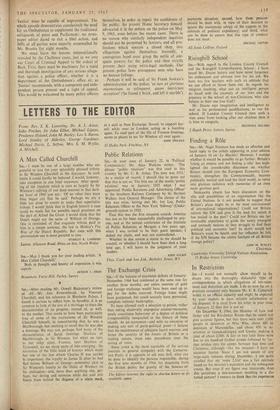The Exchange Crisis
Sta,—If the balance-of-payments deficits of January- November 1964 had continued at the same rate for another three months, our entire reserves of gold and foreign exchange would have been used up to pay for the debts incurred. Foreign loans might have postponed, but could scarcely have prevented, complete national bankruptcy.
To have allowed such a situation to persist, rather than taking electorally unpopular counter-measures, surely constitutes behaviour of a degree of political irresponsibility unequalled in the history of these islands. As an economist—and with no intention of making any sort of party-political point—I believe that the maintenance of adequate liquid reserves, and hence the security of the future of Britain as a trading nation, must take precedence over the saving of votes.
Since yours is the most reputable of the serious journals in general sympathy with the. Conserva- tive Party, it is apposite to ask you, first, what can be done to identify the persons responsible, during the first nine months of 1964, for disguising from the British public the gravity of the balance-of-
The Editor reserves the right to shorten letters to fit available space.
payments situation; second, how these persons should be dealt with, in view of their decision to ignore the unanimous advice of .ffie experts in the interests of political expediency; and third, what can be done to ensure that this type of conduct does not recur.
All Souls College, Oxford
MICHAEL LIPTON


































 Previous page
Previous page